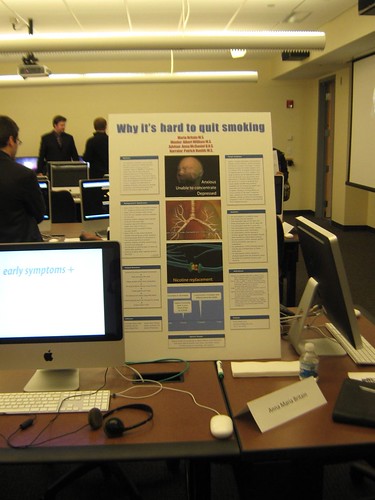Learn How To Quit Smoking Starting Today!
Everyone who cares about you tells you to stop smoking. Your doctor says that if you don't, you could suffer serious health consequences. Even your insurance provider is willing to give you discounts if you quit. Why are you still smoking? It's time to buckle down and do it, so read on for tips to help you accomplish your goal. Find a support group if you need additional support after quitting smoking. By getting together with people who are in your shoes, you can share the difficulties you are facing. You can receive support and guidance from former smokers who've successfully quit, as well as good tips for dealing with the process. Inquire at your local churches, colleges and universities, and YMCA to find out if they run support groups. When you feel the desire to smoke, try to postpone your cigarette as long as possible. To help you postpone your cigarette as long as possible, consider taking a walk or enjoying a some water before smoking. This will help you to reduce your temptations and shift your focus elsewhere. If you desire to smoke a cigarette, the delay could cause you to smoke one less cigarette that day. Start an exercise routine, or join a gym, not only for the health benefits, but to keep you busy and away from cigarettes. Exercise is a great way to relieve stress. If you are currently not in the best of shape, begin with short walks or an easy routine and build up from there. Talk to your doctor before starting any exercise routine. Hypnosis is an effective tool to use when you quit smoking. Professional hypnotists have been extremely successful in treating individuals who want to give up the habit. The hypnotist will induce a deep trance, and then repeat positive affirmations that will lodge themselves in your mind. This helps to reduce the appeal of cigarettes. Obtain the support of your loved ones in helping you quit smoking. It is vital you tell them you need and value their support, and you can do without them being judgmental. So, let people around you know that you're going to quit smoking and that your mood is going to change because of this. Quitting smoking is not easy, so you should enlist the support of your loved ones to help you through the process. If quitting smoking cold turkey is not an option, supplement your attempts with nicotine replacement products such as nicotine gum or patches. When you use these medications, you replace the nicotine from cigarettes with nicotine from the products. This helps you avoid nicotine withdrawal symptoms. If quitting smoking cold turkey is not an option, supplement your attempts with nicotine replacement products such as nicotine gum or patches. These substitutes are OTC medications that replace some of the nicotine your body is used to getting from smoking. This can ease withdrawal symptoms, and increase your chances of quitting for good. Quitting a smoking habit is hard enough, but dealing with your smoking triggers will help you out immensely. As an example, if you used to automatically light a cigarette before you made a phone call, you will need to substitute something else in its place. Look for a positive alternative to fill the time and distract your mind. The first step of any program to stop smoking is making the commitment to see it through. Often failure to stop smoking can happen because they are not motivated properly or don't have a backup plan when cravings set in. The reasons you quit will be a great motivation for you to remain smoke-free. If you would like to stop smoking, you might consider switching from your favorite brand of cigarette. Pick a new brand that you do not like. Pick the nastiest brand you know. By no account should you smoke more of your new cigarette than you did of the last. This will help you in your efforts to quit. Don't try to do it on your own. Look to your friends and family for some encouragement by letting them know that you are attempting to quit. If they can offer some assistance, allow them to give you that assistance. In addition, it's an excellent idea to find a support group to join. Simply speaking with other people who have gone through this same battle will give you added incentive to lose the habit. If you smoke in your home, give it a very thorough cleaning when you quit. Shampoo your carpets and upholstery, wash your walls and launder your drapes or curtains. Your home will smell fresh and clean, and you will not be reminded of smoking every time you walk in the door. When you commit to quitting smoking, plan out appropriate rewards for every milestone you achieve. You can go to a movie or buy something that you wanted, after not smoking for a period of time. On day 30 you can go out to dinner at a fancy restaurant. Build up the rewards until you are completely free of cigarettes. Your success is contingent on maintaining your motivation. This can be accomplished by posting motivational sayings in your office, or by wearing bracelets to symbolize your intentions. This can curb your temptations, which are the primary culprits for smoking cigarettes. There are many healthy ways of handling stress. Adopt healthier habits and hobbies such as working out, taking long walks, or listening to music and dancing. When you have some free time, have pleasant distractions around you, such as reading an excellent book, talking with your friends, or playing new games. Plan ahead, so that you are prepared to deal with stress without resorting to smoking. For smokers, the way to deal with a stressful situation is to light a cigarette. Having a plan in mind for how to handle those stressful moments makes it less likely that you will turn to cigarettes when stress strikes. Have a lot of ideas, in case your initial idea does not help. Tell everyone you know about your desire to quit smoking. They are there for you and they will help remind you that you need to quit. Using a good support system is beneficial when quitting. This will help you significantly increase your chance of successfully quitting smoking. Smoking has probably been something you used to help you go through stressful situations. If so, then before you can stop smoking, you'll need another activity to replace smoking during times of stress. Rather than lighting-up, some people find immediate stress relief in learning yoga, or taking the time to meditate. If you are an indoor smoker, be sure to clean your home thoroughly, when you give up smoking. Wash and launder everything in your house, including: carpeting, drapery and curtains, walls and any other type of surface coverings. Instead of smelling smoke when you come home, you'll smell clean, fresh fragrances. This will reduce the temptation to smoke. Increase your consumption of vegetables, fruits, seeds, and nuts when you stop smoking. Eating low calorie and healthy food help people quit for many reasons. To begin with, it gives you a way of occupying your mouth and hands so you do not miss the motions involved in smoking so much. Frequent consumption of these healthy goods also minimizes potential weight gain. As an added bonus, all the extra vitamins and minerals will help you to detox your body. Stay clear of places or things that you normally associate with smoking. If you always have a drink in one hand and a cigarette in the other, it's time to shake up your routine a little. Having your coffee in the car or avoiding the bar allows you to short circuit your cravings. When you make the decision to stop smoking, get the help of your family and friends. Let all of your friends and family know about your decision to quit. They can cheer you on and give you support, and that can be a big help for you. If you can't find this support in your home environment, consider other options, such as behavioral therapy or some kind of group settings. Your family and loved ones offer the greatest motivation for quitting. They can be affected by not only your possible illness or death, but also by negative health consequences from being around your smoke. In the United States alone, cigarette smoking is responsible for 20 percent of all deaths. Do you really want to be another statistic?
Deep Breathing
Come up with a list that states your main reasons for quitting. Repeat them to yourself, whenever you feel the urge to smoke. This will allow you to take control of your addiction, in an effort to optimize your chance for success. Use deep breathing techniques to beat a cigarette craving. You can use this deep breathing time to remind of yourself the reasons why you are making the effort to quit. It might also help bring more oxygen into your lungs, which may give you a refreshed feeling. These techniques are simple, effective and, best of all, free! Deep breathing exercises may be of assistance if you are fighting the urge to light up. This will provide you a chance to focus on all those reasons you really want to quit. It will also help your lungs absorb more oxygen and give you a calmer and more relaxed feeling. Deep breathing can be done anywhere and the techniques are easy to do. Now you have the tools you need to say goodbye to cigarettes. Your quality of life will be immeasurably improved once you no longer smoke. Spend the money you save by not paying for cigarettes and give your family a reward for giving you support through the rough times. You should start another habit that gets on someone's nerves who constantly nags you when you are smoking. If you decide to quit to get some peace and quiet, you will end up lacking the necessary motivation. Do not let this person feel like they have been proved right by explaining your real motivations. If you find pleasure in annoying them, you may start to focus more on quitting for yourself.











